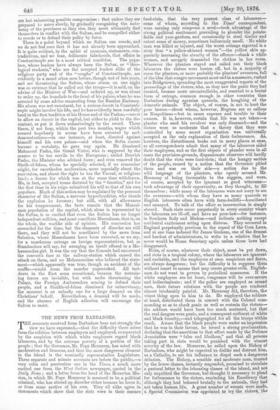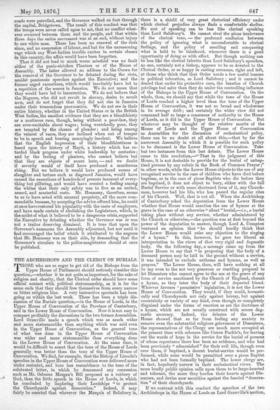THE NEWS FROM BARBADOES. food-riots, that the very poorest class
of labourers— soma of whom, according to the Times' correspondent, were earning only ninepence a week—took advantage of the strong political excitement prevailing to plunder the potato- fields and yam-gardens, and occasionally to steal timber and extort sums of money, sometimes ludicrously small. • No white man was killed or injured, and the worst outrage reported is a story that "a yellow-skinned woman "—the yellow skin ap- parently increasing the atrocity of the offence—shook a white woman, and savagely demanded the clothes in her room. Wherever the planters stayed and called out their black labourers the rioters were beaten off, but in a majority of cases the planters, or more probably the planters' overseers, full of the idea that a negro movement must end in a massacre, rushed into Bridgetown, spreading the most exaggerated reports of the proceedings of the rioters, who, as they saw the panic they had created, became molt uncontrollable, and resorted to a brutal form of outrage, common enough in other countries than Barbadoes during agrarian quarrels, the houghing of the domestic animals. The object, of course, is not to hurt the poor brutes—about whom, however, Negroes are as callous as Neapolitans—but to cause expense and trouble to their owners. It is, however, certain that life was not taken—a planter who used his revolver was only disarmed—and t1a,e rioters were so moderate that a theory that they were controlled by some secret organisation was universally accepted as the only explanation of their forbearance. As, however, the disturhances broke out in many places at once, as all correspondents admit that many of the labourers aided their employers, and as the first objects of plunder were in all cases the provision-grounds, dispassionate observers will hardly doubt that the riots were food-riots ; that the hungry section of the people, roused by a notion that the Governor pitied them and was on their side—a notion due to the wild language of the planters, who openly accused Mr. Hennessy of being favourable to the niggers, and were, of course, accepted by the ignorant as good witnesses— took advantage of their opportunity, as they thought, to fill themselves ; while many of the labourers were not sorry to see the overseers—with whom they have as many quarrels as English labourers often have with farm-bailiffs—humiliated and annoyed. To talk of the affair as insurrection is simply absurd. Such riots occur perpetually in every country where the labourers are ill-off, and have no poor-law—for instance, in Southern Italy and Madras—and indicate nothing except accidental excitement acting upon distress. They occurred in England perpetually previous to the repeal of the Corn Laws, and at one time induced Sir James Graham, one of the firmest and hardest of administrators, to write to a relative that he never would be Home Secretary again unless those laws had disappeared.
Riots, of course, whatever their object, must be put down, and riots in a tropical colony, where the labourers are ignorant and excitable, and the employers at once suspicious and fierce, are always dangerous ; but the difficulty is to suppress them without resort to means that may create greater evils. English- men do not want to govern by periodical massacres. If the white employers are let loose, vengeance will be over-severe and indiscriminate ; and if the police are employed as armed men, their future relations with the people are rendered almost intolerably painful. Mr. Hennessy did, therefore, the wisest thing open to him to do. He employed the soldiers at hand, distributed them in concert with the Colonel com- manding so as to check panic as well as restrain the rioters— the soldiers would have been too much scattered, but that the real dangers were panic, and a consequent outburst of white and black ferocity,—and telegraphed for all the troops within reach. Aware that the black people were under an impression that he was in their favour, he issued a strong proclamation, declaring that the assertions to that effect made by the Defence Association were "false and libellous," and that all persons taking part in riots would be punished with the utmost severity of the law. Moreover, he called upon the Bishop of Barbadoes, who might be expected to dislike and distrust him, as a Catholic, to use his influence to dispel such a dangerous delusion. The Bishop, a sensible and moderate man, trusted by the lower classes, instantly responded, promised to circulate a pastoral letter to the labouring classes of the island, and not only acquitted the Governor, but thought it necessary to plead for forbearance to the rioters, reminding his Excellency that although they had behaved brutally to the animals, they had not taken human life. A great number of arrests were made, a Special Commission was appointed to try the riotere, the
roads were patrolled, and the Governor walked on foot through the capital, Bridgetown. The result of this conduct was that the troops were never called upon to act, that no conflict what- ever occurred between them and the people, and that within three days the entire movement was at an end, without injury to one white man. There has been no renewal of the riots since, and no suspension of labour, and but for the unreasoning rage which any West-Indian trouble excites in certain classes in this country, the affair would have been forgotten.
That it did not lead to much worse mischief was no fault either of the panic-stricken Planters or of the House of Assembly. The latter allowed an address to the Crown for the removal of the Governor to be debated during the riots, amidst passionate speeches against the Executive ; and the former urged executions, which would inevitably have led to a repetition of the scenes in Jamaica. We do not mean that they would have led to insurrection. We do not believe that -the Negroes, who did not revolt in slavery, desire to revolt now, and do not forget that they did not rise in Jamaica under their tremendous provocation. We do not see in their entire history, whether in the United States or in the British West Indies, the smallest evidence that they are a bloodthirsty ca. a mutinous race, though, being without a poor-law, they are over-excitable about wages ; being wretchedly poor, they are tempted by the chance of plunder ; and being among the vainest of races, they are inclined when out of temper to be in speech and bearing annoyingly insolent. We believe that the English impression of their bloodthirstiness is based upon the history of Hayti, a history which has re-. bided black progress under white leadership by centuries ; and by the feeling of planters, who cannot believe but that they are objects of secret hate, — and we doubt if severity would of itself have produced a murderous rising. But we believe it would have produced scenes of slaughter and torture such as disgraced Jamaica, would have caused the executions of hundreds of persons innocent of every- thing but pilfering, and would have created a feeling among the whites that their only safety was to live as an united, armed, and masterful caste. Mr. Hennessy, therefore, seems to us to have acted with unusual propriety, all the more com- mendable because, by accepting the advice offered him, he could at once have restored his popularity with the caste of employers, and have made certain of abolishing the Legislature, which, in the midst of what it believed to be a dangerous crisis, supported the Executive by debating whether the Governor was or was not a traitor deserving dismissal. It is true that upon the Governor's summons the Assembly adjourned, but not until it had encouraged the belief which it attributed to the negroes that Mr. Hennessy was on their side, by demanding that the Governor's circulars to the police-magistrates should at once be published.































 Previous page
Previous page